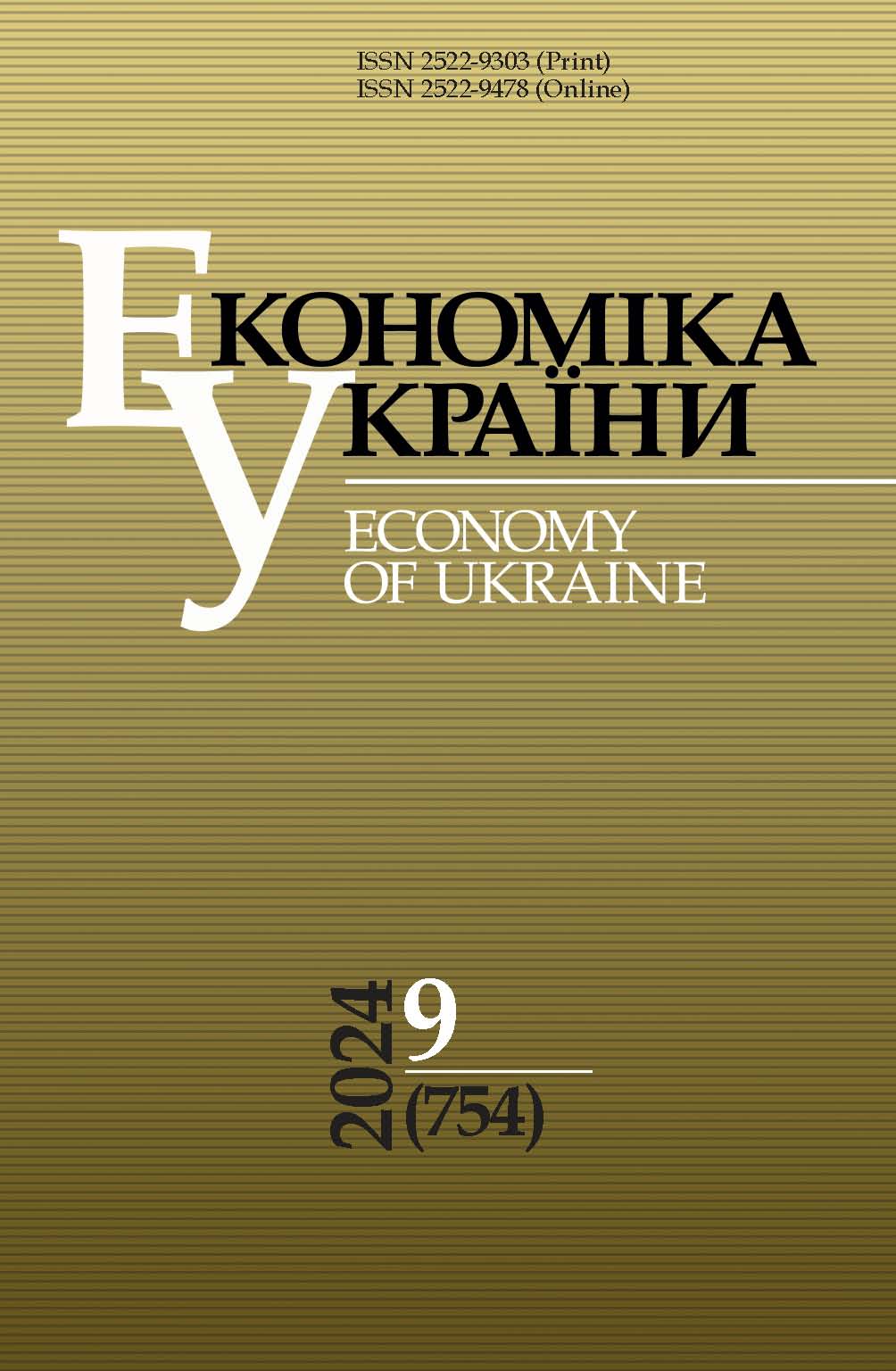THE IMPACT OF INSTITUTIONAL TRADITIONS ON THE DEVELOPMENT OF THE INSTITUTION OF SPENDING UNIT IN UKRAINE
DOI:
https://doi.org/10.15407/economyukr.2024.09.021Keywords:
budget; budgeting of public financial resources; spending unit; result management; institutional rules.Abstract
Achieving sustainable development goals and ensuring social well-being require balanced approaches and well-founded decisions on budget funds management. This issue is especially acute during the war, when there’re increased demands on spending units of budget funds regarding the high-quality exercise of powers conferred on them in the budget process, ensuring the rational and efficient use of resources, and the effective implementation of budget programs.
It is established that cases of violations of budget legislation, embezzlement, and non-fulfillment of their obligations to communities by spending units of budget funds are not isolated. Therefore, the need arises to find out the deep roots of these problems, among which, according to our hypothesis, are institutional traditions.
The impact of stable institutional rules on spending units’ behavior has been identified, and proposals for improving the institution of spending unit in Ukraine have been substantiated, taking into account this factor. It has been established that, according to world experience, the institution of spending unit rests entirely on the decentralization of powers to effectively obtain results. Spending units have the freedom of operational management of their budgetary allocations, the freedom of informational influences on the content of indicators of their activity without instructions from above. It is shown how this concept was distorted by the Ukrainian budgeting practice of the first two decades of independence. Spending units did not get enough subjectivity for full-fledged micro-budgeting of networks, accordingly, they cannot organize their activities for the medium term. To fix this situation, it is proposed: 1) to leave the institution of spending unit to the heads of public entities — heads of territorial communities, special officials of agencies that implement projects with their own and budget funds, heads of public entities such as higher education institutions of state and communal forms of ownership; 2) to differentiate between result-driven budget allocations on the basis of accountability and own incomes of spending unit organizations. This will increase the efficiency of spending units and contribute to the introduction of medium-term budgets.
References
Hutsaylyuk, L. (2010). Accounting for financing of budgetary institutions. Galician economic journal. No. 3(28). P. 191-196. URL: https://elartu.tntu.edu.ua/bitstream/123456789/817/2/GEB_2010_v28_No3-L_Hutsaylyuk-Accounting_funding_%20of__191.pdf [in Ukrainian].
Deykalo, L., Chubak, A. (2015a). The role of the managers of budget funds at all stages of the budget process. Efficient Economy. No. 3. URL: http://www.economy.nayka.com.ua/?op=1&z=3889 [in Ukrainian].
Deykalo, L., Chubak, A. (2015b). The interaction of Treasury with the spending units of the state budget fund, the ways of its improvement. Efficient Economy. No. 1. URL: http://www.economy.nayka.com.ua/?op=1&z=3746 [in Ukrainian].
Savateyeva, O. (2012). Functions of the State Treasury Service of Ukraine bodies regarding the servicing of estimates of managers and recipients of budget funds. RFI Scientific Papers. No. 1(58). P. 79-85. URL: https://dspace.onu.edu.ua/server/api/core/bitstreams/6b575428-a975-4d59-867c-adee4e9343d8/content [in Ukrainian].
Ambarchian, M. (2016). Methodical frameworks of accounting for revenues and expenses of budget-funded bodies. Economic Forum. No. 3. P. 299-304. URL: https://er.knutd.edu.ua/bitstream/123456789/1953/1/20160905_101.pdf [in Ukrainian].
Zarosylo, A. (2017). Methodical approaches to analysis income and expenditure by budget funds managers. The Institute of accounting, control and analysis in the globalization circumstances. Vol. 3-4. P. 95-102. URL: http://ibo.wunu.edu.ua/index.php/ibo/article/viewFile/323/323 [in Ukrainian].
Ulyanchenko, Y., Маrchenko, L. (2018). The role of the State Treasury Service of Ukraine in providing the observance of budget legislation requirements by managers (recipients) of budget funds. Efficiency of public administration. Vol. 2 (55). Part. 2. P. 195-201. URL: https://epa.nltu.edu.ua/index.php/journal/article/view/215/212 [in Ukrainian].
Proskura, K. (2019). Organization of internal control by budget organizations (institutions) as a budgetary funds manager. Criminalistics and Forensics. Vol. 64. P. 689-698. https://doi.org/10.33994/kndise.2019.64.65 [in Ukrainian].
Radionov, Yu. (2012a). The main types and essence of budget violations. Economy of Ukraine. 55. 08 (609). 55-63. URL: http://nbuv.gov.ua/UJRN/EkUk_2012_8_7 [in Ukrainian].
Radionov, Yu. (2012b). Managerial decisions as a factor of inefficient use of budget funds. Economy of Ukraine. 55. 12 (613). 41-51. URL: http://jnas.nbuv.gov.ua/article/UJRN-0000055986 [in Ukrainian].
Zodi, Richard Yu. (1987). Performance budgeting. Virginia Polytechnic Institute and State University. 147 p. [in Ukrainian].
Andrushchenko, V., Fedosov, V. (1995). Zaporozhian Sich as a Ukrainian phenomenon. Kyiv. 173 p. [in Ukrainian].
Habora, L. (2011). Budget relations of Ukraine: formation and development. Scientific Bulletin of Uzhhorod University, Series "Economics". Vol. 2 (34). P. 232-237 [in Ukrainian].
Barmak, M. (2016). Formation of the Russian imperial system of civil service on Ukrainian lands (ХVІІІ–ХІХ centuries). Ternopil. 392 p. [in Ukrainian].
Chuhunov, I. (2005). The budget of the Ukrainian SSR as part of the USSR budget system. RFI Scientific Papers. No. 4. P. 3-26 [in Ukrainian].
Derkach, T. (2020). Methodical support of results-oriented budgeting in the local self-governance system. Market Economy: Modern Management Theory and Practice. Vol. 19. No. 1(44). P. 122-139. https://doi.org/10.18524/2413-9998.2020.1(44).198359 [in Ukrainian].
White, J. (2015). What are budgeting's purposes? Comments on OECD's principles of good budgetary governance. OECD Journal on Budgeting. Vol. 2014/3. https://doi.org/10.1787/budget-14-5jrtl4wnr8zw
Zhyber, T. (2019). Performance in financial management of public resources. Securities Market of Ukraine. No. 1-2. P. 34-40. URL: https://www.researchgate.net/publication/361489561_Rezultativne_upravlinna_publicnimi_finansovimi_resursami_Performance_in_financial_management_of_public_resources [in Ukrainian].
Fedosov, V., Oparin, V., Safonova, L. et al. (2004). Budget management: Textbook. V. Fedosov (Ed.). Kyiv, KNEU. 864 p. [in Ukrainian].
Shoot, S. (2013). Planing and budgeting of public capital investments on local level. Efficient Economy. No. 6. URL: http://www.economy.nayka.com.ua/?op=1&z=2152 [in Ukrainian].
Tsyganova, N., Zhyber, T. (2023) Data-driven conceptual approach to investment project budgeting for sustainable development of Ukraine. Finance of Ukraine. No. 3. P. 27-43. https://doi.org/10.33763/finukr2023.03.027 [in Ukrainian].
Azarenkova, G., Buriachenko, A., Zhyber, T. (2020). Anticorruption efficacy in public procurement. Financial and credit activity problems of theory and practice. No. 2(33). P. 66-73. https://doi.org/10.18371/fcaptp.v2i33.206412
Yushko, S. (2018). Financial frauds and abuses in the sphere of public procurement and the measures of counteracting them. Current problems of economy and entrepreneurship. No. 21. P. 118-125. URL: http://sb-keip.kpi.ua/article/view/128048 [in Ukrainian].
Downloads
Published
How to Cite
Issue
Section
License
Copyright (c) 2024 Economy of Ukraine

This work is licensed under a Creative Commons Attribution-NonCommercial-NoDerivatives 4.0 International License.



